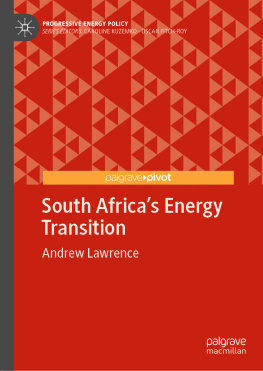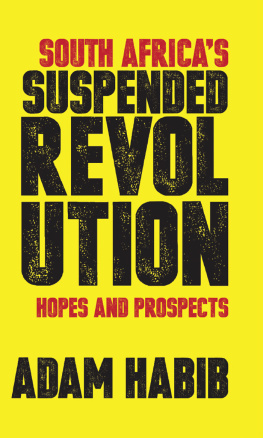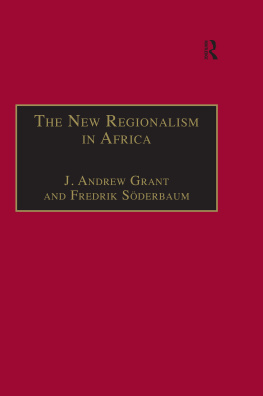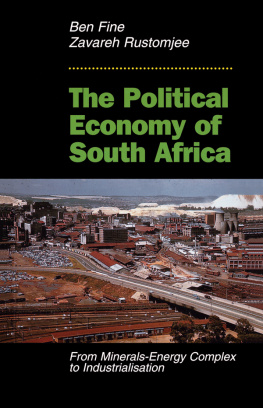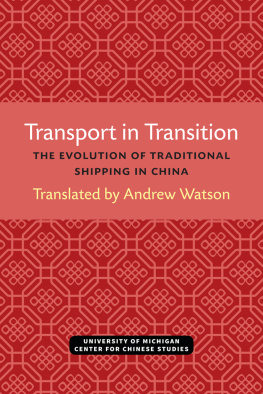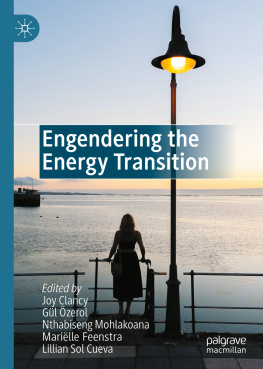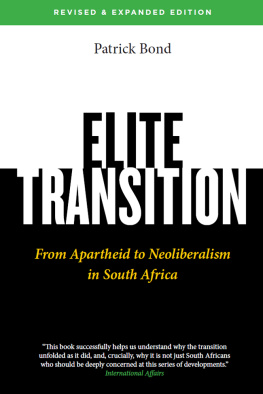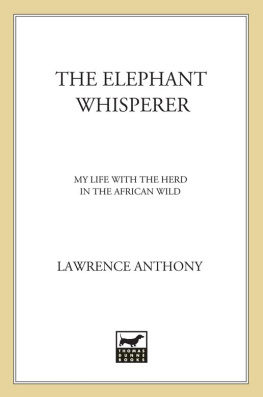Andrew Lawrence - South Africa’s Energy Transition
Here you can read online Andrew Lawrence - South Africa’s Energy Transition full text of the book (entire story) in english for free. Download pdf and epub, get meaning, cover and reviews about this ebook. year: 2020, publisher: Palgrave Macmillan, genre: Politics. Description of the work, (preface) as well as reviews are available. Best literature library LitArk.com created for fans of good reading and offers a wide selection of genres:
Romance novel
Science fiction
Adventure
Detective
Science
History
Home and family
Prose
Art
Politics
Computer
Non-fiction
Religion
Business
Children
Humor
Choose a favorite category and find really read worthwhile books. Enjoy immersion in the world of imagination, feel the emotions of the characters or learn something new for yourself, make an fascinating discovery.
- Book:South Africa’s Energy Transition
- Author:
- Publisher:Palgrave Macmillan
- Genre:
- Year:2020
- Rating:4 / 5
- Favourites:Add to favourites
- Your mark:
- 80
- 1
- 2
- 3
- 4
- 5
South Africa’s Energy Transition: summary, description and annotation
We offer to read an annotation, description, summary or preface (depends on what the author of the book "South Africa’s Energy Transition" wrote himself). If you haven't found the necessary information about the book — write in the comments, we will try to find it.
South Africa’s Energy Transition — read online for free the complete book (whole text) full work
Below is the text of the book, divided by pages. System saving the place of the last page read, allows you to conveniently read the book "South Africa’s Energy Transition" online for free, without having to search again every time where you left off. Put a bookmark, and you can go to the page where you finished reading at any time.
Font size:
Interval:
Bookmark:
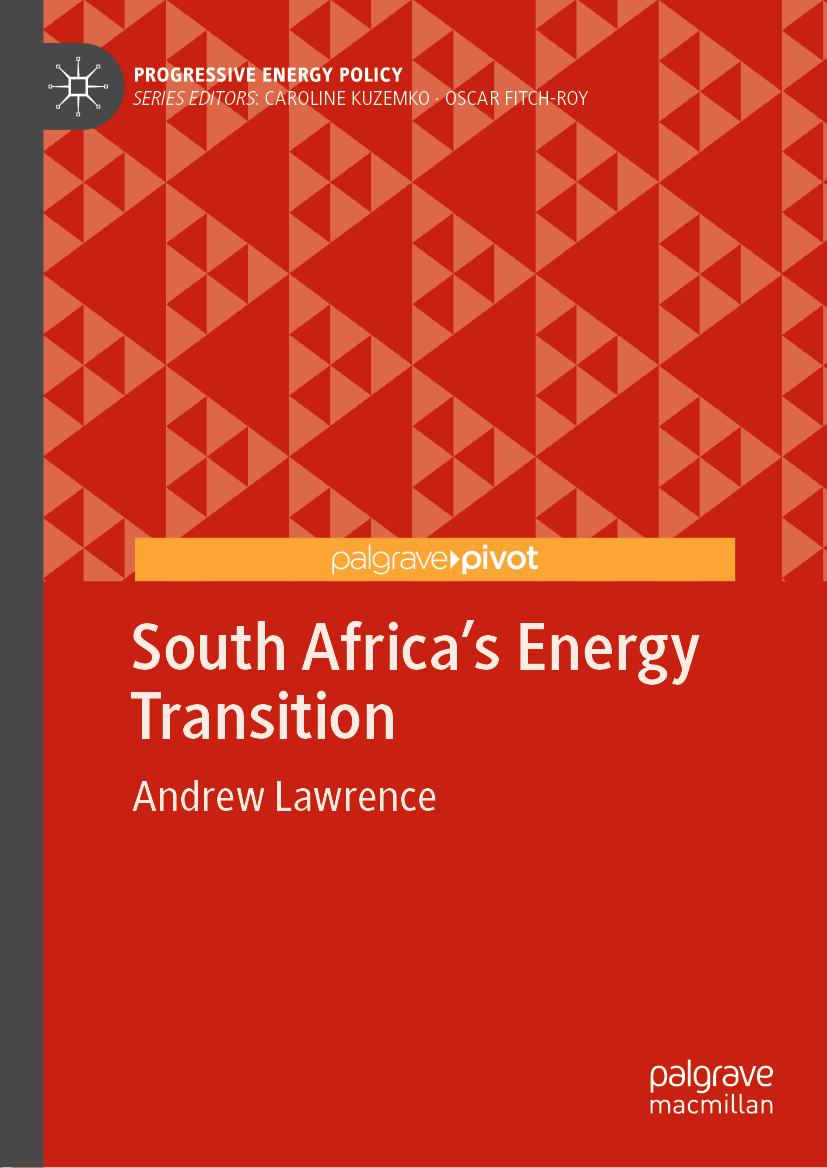
Progressive Energy Policy is a new series that seeks to be pivotal in nature and improve our understanding of the role of energy policy within processes of sustainable, secure and equitable energy transformations. The series brings together authors from a variety of academic disciplines, as well as geographic locations, to reveal in greater detail the complexities and possibilities of governing for change in energy systems. Each title in this series will communicate to academic as well as policymaking audiences key research findings designed to develop understandings of energy transformations but also about the role of policy in facilitating and supporting innovative change. Individual titles will often be theoretically informed but will always be firmly evidence-based seeking to link theory and policy to outcomes and changing practices. Progressive Energy Policy is focussed on whole energy systems not stand alone issues; inter-connections within and between systems; and on analyses that moves beyond description to evaluate and unpack energy governance systems and decisions.
More information about this series at http://www.palgrave.com/gp/series/15052

This Palgrave Pivot imprint is published by the registered company Springer Nature Switzerland AG
The registered company address is: Gewerbestrasse 11, 6330 Cham, Switzerland
Within the space of a few years, the topic of energy transitions has itself transitioned from being the preserve of relatively few specialists to one that commands mass attention and global concern. Increasingly, we appreciate the many ways in which local choices about energy production, distribution, and consumption can have global consequences, for generations to come. Popular struggles against fossil fuel extraction and for more sustainable alternatives, however remote geographically, are directly relevant to communities everywhere. For this reason, case studies of energy transitions may be of interest to readers far beyond the country or region in question. I decided to write on South Africas energy transition not only for these reasons, but also because no book existed on the topic that discussed its technical and political as well as ecological dimensions. While it is impossible to do full justice to each, my hope that a succinct synthesis of these facets will appeal to readerships interested in any one of them, and to specialists and non-specialists alike.
This book draws on more than two decades of writing on and engaging with South Africans about the countrys history, politics, and struggles for a better life for all. More immediately, it grew out of a 2016 lecture at the University of Kwa-Zulu Natals Centre for Civil Society on the countrys proposed nuclear power programme. I want to thank Patrick Bond, the Centres director at the time (and now colleague at the Wits School of Governance), for his hospitality in hosting me, facilitating my presentation at the Wits School of Governance in 2018, and for debating some of the issues covered here in the process. My thanks as well to the UKZN Centre for Civil Societys current Director, Shauna Mottiar; to Harald Winkler, Jiska de Groot, and Hilton Trollip of the Energy Research Centre, University of Cape Town; and to Lucien van der Walt at the Department of Sociology, Rhodes University, for hosting talks and providing useful feedback; and to the Habib, Nagdee, and Sienaert households for their hospitality during research visits.
I received useful feedback at several conferences and lectures, including the Low Carbon Energy Democracy Conference at Durham, UK, in September 2017; the IAIA Environmental Justice in Societies in Transition conference, Durban, SA, in May, 2018; the Energizing Futures conference in Tampere, Finland, in June 2018; and the World Congress of Political Science in Brisbane, Australia, in July 2018. Im most grateful to Kate Lebow and Jeff Rudin for their helpful feedback on earlier drafts; the usual disclaimers apply.
Several other thoughtful interlocutors generously discussed various themes related to South Africas energy politics, political economy and political ecology, including Kolya Abramsky, Des DSa, Keith Dumas, Happy Khambule, Heila Lotz-Sisitka, Jonathan Neale, and France Sesedinyane. I acknowledge in particular my debt to Muna Lakhani, and join many in mourning his passing. Munas dedication to the cause of social and ecological justice (he would pardon the tautology) is as renowned as his selfless impulse to help others. He generously provided early encouragement and shared ideas; this book is dedicated to him. Finally, thanks to Thangarasan Boopalan and Sruthi Sethu of Palgrave Macmillan, as well as series co-editor Caroline Kuzemko, for their responsiveness and guidance throughout this process.
Font size:
Interval:
Bookmark:
Similar books «South Africa’s Energy Transition»
Look at similar books to South Africa’s Energy Transition. We have selected literature similar in name and meaning in the hope of providing readers with more options to find new, interesting, not yet read works.
Discussion, reviews of the book South Africa’s Energy Transition and just readers' own opinions. Leave your comments, write what you think about the work, its meaning or the main characters. Specify what exactly you liked and what you didn't like, and why you think so.

